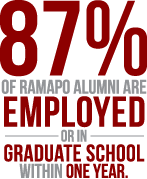College Catalog: 2015-2016
ASB: Master of Business Administration (MBA)
Website: Master of Business Administration
Program Director:
- Timothy Landers (ASB)
Faculty:
Faculty:
- Romulo Magnaye
- Alexandre Olbrecht
- Edward Petkus
- Sridevi Shivarajan
- Current as of September 2015
Resources:
The Anisfield School of Business MBA Program prepares students to become senior leaders of a broad range of commercial enterprises and non-profit organizations. This is accomplished through a comprehensive and highly integrated learning experience that gives students a solid base of global business knowledge and the ethical and socially responsible leadership skills to excel in today’s complex and rapidly changing business environment.
Students completing the program will have:
- The quantitative, and qualitative and technology skills to transform data from various sources into valuable information that informs strategic and operational decision making,
- An in depth understanding of major business functions and the key issues of and interrelationships among them,
- Well-honed leadership skills that prepare them to responsibly and ethically address business problems and opportunities,
- The ability to communicate effectively at all levels of an organization, and with its external stakeholders,
- A global perspective and sensitivity that allows them to successfully apply their business acumen anywhere in the world,
- This program also provides additional concentrations of knowledge in student selected areas, all of which give students specialized and highly marketable skills that will help them to quickly advance along their career paths, and
- Substantial experience in applying their newly acquired knowledge and skills through real world case studies and consulting projects conducted for domestic and multinational business clients.
The 42 credit, accelerated program is delivered over 20 months in a hybrid format with classes on campus two weeknights per week and online sessions required each week. Students complete 6 credits (2 three credit courses) during each of 7 academic terms of 10 weeks. There are four terms in the first year (fall, winter, spring and summer) and three terms in the second year (fall, winter and spring). The program is a cohort model where students move through the 20 month program together, providing support and networking opportunities.
Students participate in an international immersion trip where they learn to draw comparisons between their own culture and that of the country in which they study, and to knowledgeably discuss business dynamics of the country in which they study.
Goal 1: Analytical Problem Solving: The quantitative and qualitative analytical skills to transform data from various sources into valuable information that informs strategic and operational decision making.
Outcome 1: Our students will be able to apply analytical decision making models to a variety of business situations and make recommendations supported by the analysis, presenting all key assumptions and rationales.
Goal 2: Integrative Foundational Knowledge: In depth understanding of major business functions and the key issues of and interrelationships among them.
Outcome 1: Our students will be able to identify problems, analyze their root causes, suggest the most appropriate solutions, show what changes must be implemented and how those changes would impact different functional areas of the organization.
Goal 3: Global Perspective: A global perspective and sensitivity that allows them to successfully apply their business acumen anywhere in the world.
Outcome 1: Our students will formulate appropriate strategic alternatives for an organization based on its global competitive environment.
Goal 4: Leadership: Well-honed leadership skills that prepare them to responsibly and ethically address business problems and opportunities.
Outcome 1: Our students will provide evidence of understanding individual leadership styles, engaging in team building, and wielding interpersonal influence.
Outcome 2: They will identify business problems and opportunities and implement responsible and ethical solutions and/or innovations.
Goal 5: Communication: The ability to communicate effectively at all levels of the organization, and with its external stakeholders.
Outcome 1: Our students will demonstrate effective oral and written communications skills.
- Courses are taken in sequence and each student must register for both courses being offered each term.
- To remain in good academic standing, students must maintain a cumulative GPA of 3.0.
- Subject & Course # – Title and Course Description
- FALL TERM
- MBAD 601 - ACCOUNTING FOR MANAGERIAL DECISION MAKING
- MBAD 610 - BECOMING A 21ST CENTURY LEADER
- WINTER TERM
- MBAD 615 - BUSINESS ANALYTICS
- MBAD 640 - MARKETING MANAGEMENT & STRATEGY
- SPRING TERM
- MBAD 602 - MANAGERIAL ECONOMICS
- MBAD 612 - LEADING CHANGE IN AN UNCERTAIN WORLD
- SUMMER TERM
- MBAD 620 - FINANCIAL MANAGEMENT I
- MBAD 660 - OPERATIONS MANAGEMENT
- FALL TERM
- MBAD 680 - MANAGING GLOBAL BUSINESS
- MBAD 682 - GLOBAL IMMERSION EXPERIENCE:CHINA
- WINTER TERM
- MBAD FIRST ELECTIVE (see list below)
- MBAD SECOND ELECTIVE (see list below)
- SPRING TERM
- MBAD 614 - LEADING BUSINESS IN CONTEMPORARY TIMES
- MBAD 710 - CAPSTONE CONSULTING PROJECT
- ELECTIVES: SELECT TWO
- MBAD 622 - FINANCIAL MANAGEMENT II
- MBAD 624 - SECURITIES ANALYSIS & PORTFOLIO MANAGEMENT
- MBAD 642 - INNOVATION AND TECHNOLOGY IN MARKETING STRATEGY
- MBAD 644 - MARKETING RESEARCH
- MBAD 662 - SUPPLY CHAIN MANAGEMENT
- MBAD 664 - PROJECT MANAGEMENT






